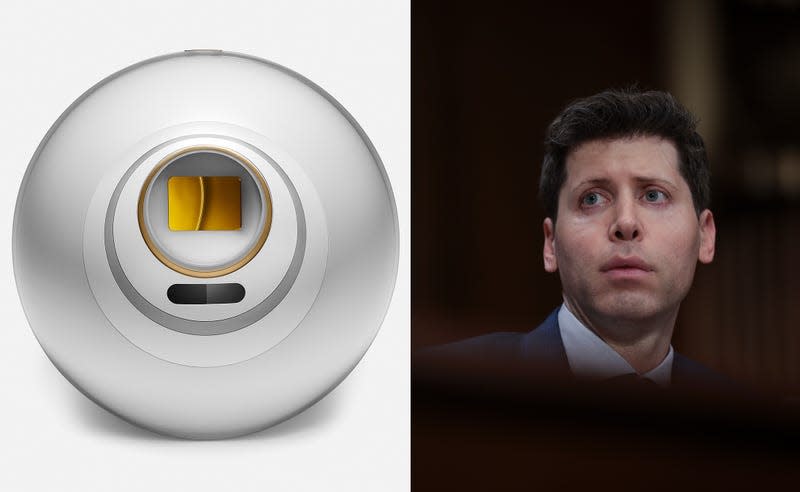OpenAI Founder's Worldcoin Reportedly Perpetuates Black Market for Iris Data

- Oops!Something went wrong.Please try again later.
The Worldcoin “Orb” is meant to collect a detailed scan of users’ irises in exchange for crypto. Co-founder Sam Altman, the CEO of OpenAI, has said this is necessary to prove “humanness” in the age of artificial intelligence.
Crypto has broken new ground yet again, not in the exchange of digital currencies meant to upset the global economic paradigm, but by facilitating the black market trade of people’s biometric data. Specifically, fraudsters desperate to glom onto a crypto project headed by OpenAI CEO Sam Altman are reportedly buying detailed scans of people’s irises in order to claim coins for the still-unreleased Worldcoin project.
The news first came to light by China-based crypto outlet BlockBeats, which tweeted Thursday about a black market for irises used to gain access to the Worldcoin network beta. Users need to submit their eye to a scan by a Worldcoin “Orb,” a physical imaging device used to capture high-resolution images of their body and face. Those who do are promised free crypto tokens while their accounts are anonymized. Essentially, the project wants to offer a kind of universal basic income for all those who prove they’re still “human” and not one of Altman’s own AI chatbots (or worse, Altman’s ill-defined sense of a so-called AGI).
Read more
These Orb operators are spread throughout the countries where the company currently operates, which as it happens does not include mainland China. The company says there are more than 1.7 million people signed up so far. But according to BlockBeats, people in China are buying the iris data from people in Cambodia, Kenya, and a few other countries for as little as $30 a pop.
Worldcoin claims that the issue is actually that verified “World IDs,” rather than actual iris scans, are being sent to a third-party World app on the black market. World IDs are essentially certificates that indicate someone is a unique person. The company told Gizmodo in an email the issue was limited to “a few hundred instances” of fraud. The company claimed it was modifying the signup process and was using dynamic instead of static QR codes to cut down on abuse. The company also pointed to its efforts to create a new recovery process for users’ World ID.
That’s not the only security issue the company has had as of late. TechCrunch reported last week that hackers managed to install malware on several Orb operators’ devices. This allowed the malicious actors access to the Worldcoin online portal that displayed earnings, sign-ups, and more. An anonymous security researcher told the site that there were several Orb operators’ login credentials circulating on dark web marketplaces.
For as much attention was paid to the “secure” nature of Worldcoin, reports show the Orb operator’s logins did not even necessitate two-factor authentication, though 2FA isn’t the end-all, be-all of digital security. A spokesperson told TechCrunch that hackers did not access users’ biometric info and that no sensitive data was taken.
Based on the company’s statements, it seems execs are more concerned with the harm caused to its big crypto scheme rather than the black market trade of biometric data that’s now immutably tied to the blockchain. The project has already been taken to task in a report from MIT Technology Review for targeting poor communities in exchange for data. Worldcoin has said its verification process allows for users to maintain anonymity while verifying their “humanness.” The company previously said in a March blog post “Advancements in AI make it difficult to distinguish between AI and humans on the internet, highlighting a need for authentic human recognition and verification.”
Altman’s OpenAI is one of the biggest companies responsible for the proliferation of modern artificial intelligence. The CEO is a longtime silicon valley figurehead and investor, having been an early partner of Y Combinator and an extremely brief time as CEO of Reddit. He co-founded Worldcoin in 2019 shortly before he decided to put most of his energy into OpenAI.
So is Altman creating the problem he then claims necessitates his crypto side hustle? Well, he is one to have his cake and eat it too. In a recent sit-down with members of Congress, he declared he was in favor of AI regulation, as long as it still grants wide access to millions of potentially paying customers. Despite the depreciated price of crypto worldwide, Worldcoin is hoping to close on another $100 million in funding, according to the Financial Times based on anonymous sources close to the deal. One of Altman’s previous backers for Worldcoin was Sam Bankman-Fried, the now-indicted former CEO of FTX. Ironically, this other Sam was himself a major proponent of favorable regulation for the crypto industry.
More from Gizmodo
Sign up for Gizmodo's Newsletter. For the latest news, Facebook, Twitter and Instagram.

